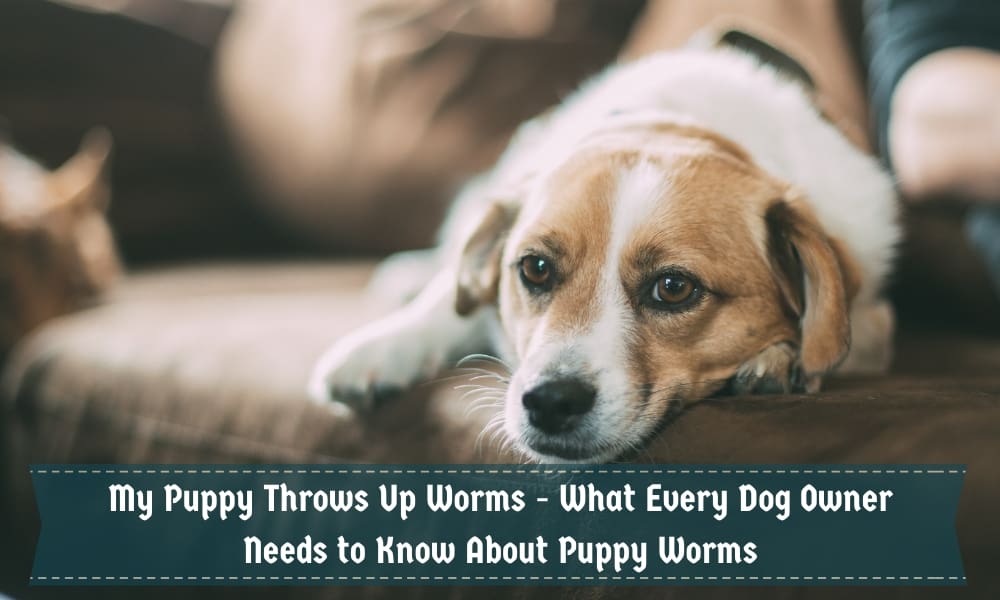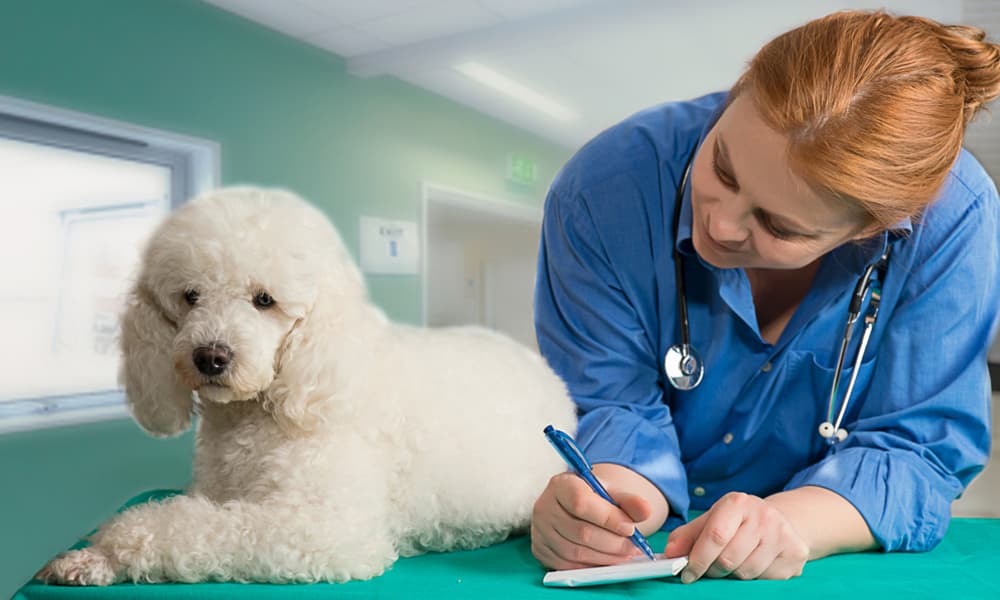
The worst has happened – your precious baby has started throwing up thin, spaghetti-like creepy crawlies and you have no idea why it’s happening or what to do about it. Realizing your puppy has worms can be scary for any dog owner. After all, shouldn’t this have been taken care of when your dog was dewormed as a young puppy? Unfortunately, that’s not always the case. Worms may not be difficult to get rid of initially but they’re difficult to keep away from a susceptible puppy. We’re going to help you understand why your puppy is throwing up worms and what every dog owner needs to know about them.
Contents
- What Are Worms?
- How Do Puppies Get Worms?
- Types of Worms
- Why is my puppy throwing up worms?
- Signs and Symptoms of Worm Infestation
- Scooting or sledging does not mean your puppy has worms.
- How can I confirm my puppy has worms?
- How can I treat my puppy for worms?
- Puppy worming schedule
- How to administer worm medication to puppies
- Can my puppy build up an immunity to worms?
- Does fresh puppy poop contain worms that are dangerous to humans?
- Worm Infestation and Travel
What Are Worms?
The worms found in dogs are not the same as our little friends who wriggle around in the soil outside. These worms are a type of parasite, like fleas and ticks – an organism that lives on or inside another living thing and benefits by leaching nutrients at the other’s expense. The thought of an organism living off our dear, sweet puppy is not a pleasant one. Worst of it all, these tiny parasites have most likely attached themselves to your puppy’s intestine.
Worms come in a variety of types and are contracted in different ways. The type of worms that your puppy was most likely born with is roundworm which is indeed a parasite that lives in your puppy’s small intestine. That said, different types of worms cannot only settle in the small and large intestines but also the heart and lungs. Some focus mainly on getting nutrients from your pup’s body while others are interested, frighteningly, in its blood supply.
Some types of common worms are not worms at all – some are fungus and cause more skin irritation than anything else. These types of worms are not internal and live on the surface of the skin.
How Do Puppies Get Worms?

Puppies are highly susceptible to getting worms, and unfortunately, they’re the perfect host. Worms can be picked up from virtually anywhere, including ingesting feces, soil, or grass that contains worm eggs, mosquito bites, or fleas. That said, did you know that most puppies are born with worms that are not contracted through any of these other means?
Nearly all puppies are born with roundworms. You may wonder why the mother wasn’t treated for roundworm – do all adult dogs have worms and she just wasn’t treated before becoming pregnant? Well, not exactly. Nearly all adult female dogs have dormant larvae in their tissue that cannot be eliminated through deworming. These larvae come to life at the end of the mother’s pregnancy when they make their way into the lungs of the newborn puppies. This may happen through either the placenta or the mother’s milk. Once the previously dormant larvae have migrated to the puppies’ lungs, it makes its way to their small intestine where it sets up camp.
Types of Worms
There are a whopping seven different types of worms that can be found in puppies, although some are much more common than others. These types of worms include:
● Roundworm
This is the most common type of worm in puppies and the one that your puppy was likely born with and, as we mentioned, are transferred from the mother herself either in utero or is through milk.
Once the roundworm larvae find their way to the intestinal tract they can grow up to five inches in length. Once settled in the intestinal tract, the fully-grown ringworm starts shedding its own eggs, officially setting up camp in your puppy’s small intestine. At this point, your puppy can infect others as it starts passing these worms in its stool. If another dog, cat, or animal somehow ingests its stool or the grass or soil that the stool once sat on, they may become infected. Roundworm is the main reason why puppies are dewormed multiple times from birth, both as a treatment and a preventative measure.
● Ringworm
Ringworm is not always considered a parasitic worm because it’s actually a fungus. Ringworm lives on the outer layer of a dog’s skin and can be spread by contact with another animal that already has it or even by an infected couch where that animal has lain.
Ringworm can present itself as small, circular hairless spots where the hair follicle has broken. Thankfully, ringworm is not life-threatening but it is certainly unpleasant. It’s important to get this fungus treated immediately – not only is it uncomfortable for our puppy but it can be passed onto humans.
● Whipworm
No direct contact between your dog and another animal is needed contract whipworm. All a dog needs to do is ingest whipworm eggs and it can become infected. This usually occurs when a dog consumes feces or infected soil or grass where the feces may have been. Whipworm is not only present in dogs but also foxes, coyotes, and other wild animals so extra care to protect your pup should be taken in areas where wild animals roam. Whipworm can live off the environment for years and is easily contracted so it is a significant risk to your dog or puppy.
Whipworm lives in the large intestine and does not shed many eggs, making them somewhat difficult to diagnose. Multiple stool samples may not show the presence of whipworm eggs even if your dog has them in its system. Therefore, whipworm usually has to get worse before a vet can correctly diagnose it.
● Hookworm

Hookworm infection is one of the worst kinds that your puppy can contract as it can be fatal. Hookworms are small and thin and attach themselves to your puppy’s small intestine where they feed off your puppy’s blood supply. This can very quickly result in anemia. Frighteningly enough, hookworms can be transmitted in utero or through the mother’s milk supply and can also be contracted by ingesting eggs that have been living in contaminated stool or soil.
● Coccidia
Coccidia is a single-celled parasite that can cause coccidiosis and infect puppies a long time before they show signs of being ill which makes it especially dangerous. Although multiple types of coccidia exist, puppies are most commonly affected by Isospora, also known as Cystoisospora. This parasite lives in the lining of the intestine. Small puppies are the most vulnerable to infection. Puppies eventually show signs of being ill whereas adult dogs may never show any symptoms.
● Tapeworm
Tapeworm is transmitted to dogs or puppies that have ingested fleas with tapeworm eggs in their bellies. If a dog likes hunting and eating wildlife or rodents, they may also contract tapeworm from them. Tapeworms can grow quite large and usually end up being four to six inches in length with as many as 90 segments per tapeworm.
Tapeworms can often be visibly seen attached to the fur around the anus or tail so they are generally easily diagnosed. Unfortunately, they are not easily killed.
● Heartworm
It is a common misconception that puppies cannot contract heartworm or that it is not dangerous to them. If a puppy does have heartworm, the heartworm can take up to six months to become an adult, making it truly dangerous. Heartworm can cause death in dogs or puppies if untreated as it lives inside the heart and arteries.
Why is my puppy throwing up worms?
There are a couple of reasons why your puppy may be physically throwing up worms.
One reason may be that the invasion of worms in your puppy’s poor tummy is causing them to be nauseous, resulting in vomiting.
The second reason may be that your puppy has a bowel obstruction caused by worms, which can cause both diarrhea and vomiting.
Signs and Symptoms of Worm Infestation
When it comes to signs and symptoms of worms, these vary on a case by case basis. Some puppies will have no symptoms at all until the worms progress to a very advanced stage. At this point, the worms have become a serious risk to your pup’s health and you should seek immediate treatment from a veterinarian. Certain types of worms, depending on their severity, can be fatal.
Some of the most common visible signs and symptoms of worms in puppies include:
- Vomiting
- Diarrhea
- Coughing
- Low energy
- Potbellied appearance
- Change in appetite
- Weight loss
- Dull coat
- Itching and signs of skin irritations
- Rubbing their bottom on the ground
- Visible worms in fur and/or feces
Scooting or sledging does not mean your puppy has worms.

While the above symptoms do not exclusively mean that your puppy has worms, a common misconception is that a puppy scooting or rubbing its bum on the ground always means that it has worms. Again, just like any of the above symptoms, there are many causes of a puppy exhibiting this behavior, not all of which have to do with worms. The two most common reasons for this type of behavior are impacted or infected anal sacs – your pup may have some poop stuck in its bum – or allergies that are causing itchy skin. A vet can usually tell just by looking at the area what the cause of the scooting may be. If it’s the case of an impacted anal sac, you will likely be able to see the physical evidence of this yourself as your puppy leaves residue along your floor.
How can I confirm my puppy has worms?
The only way to truly confirm if your puppy has worms is to have a vet diagnose them. Generally, this is done by submitting a stool sample. Even if you cannot see the fully matured worms, you should be able to see their eggs. That said, certain types of worms lay very few eggs so your puppy may only be able to be diagnosed through physical symptoms.
You may be able to see the worms yourself in your poor puppy’s vomit or stool. Adult roundworms and hookworms look like small to large pieces of spaghetti and are off-white to light brown. Tapeworm segments are not quite as thin and are be white if they are fresh.
How can I treat my puppy for worms?
When it comes to deworming your puppy, there isn’t a single go-to treatment – there are different treatments available and they are highly dependent on the type of worm your puppy’s dealing with and how severe the infection is.
It is important to never take it upon yourself to purchase over the counter worm medication, without the direction of your vet. It is very likely you’ll end up treating your puppy for the wrong kind of infestation and give it the wrong dosage. Not only should the type of worm and the severity of the infestation be considered but also the size and age of your puppy.
Puppy worming schedule
Deworming is a basic and routine part of puppy care. Your puppy should have been dewormed at least once before coming home by either the breeder or the rescue organization. This is because it is almost guaranteed that your puppy will have been born with worms – so, this is not something you want to mess around with, especially if you have other animals.
When it comes to your puppy’s worming schedule and what they should be treated for, it’s best to consult your vet. They will tell you what they think is best, especially given your puppy’s lifestyle and where you’re located. That said, here are some general guidelines to follow:
- A puppy should be administered a dewormer first at two weeks and then at two-week intervals until they are eight weeks old.
- A dog should be tested once per year for heartworm.
- A puppy’s feces should be examined for worms every three months in the first year.
- After the first year, a dog’s feces should be examined twice per year.
- It is advisable to give your dog year-round parasite control regularly, usually up to four times per year. Your veterinarian should determine how often your particular pup needs parasite control and for which parasites.
- Both pregnant and nursing dogs should be on a broad-spectrum medication that controls parasites to minimize the amount that may be passed on to their puppies.
- If you are intending to board your dog in a kennel or have them attended a dog daycare or puppy class, it generally required that they have recently been tested for parasites and are on parasite control.
How to administer worm medication to puppies

Depending on the treatment plan, your vet may either consistently administer deworming medication to your pup themselves or have you administer follow up treatments with the medication they prescribe.
Dewormers are either given orally or through the skin and are extremely simple to administer. Dewormers administered in pill form are made to be very tasty for dogs and your pup will likely just take it down like a treat.
Some dewormers also double as a flea and tick control are absorbed through the skin and are generally administered between the puppy’s shoulder blades.
Certain types of dewormers come in a paste and are given orally with a syringe. In that case, you simply insert the correct dose into the syringe, hold your puppy in a firm and manageable position, and inject the dewormer towards the side, at the back of its mouth.
Can my puppy build up an immunity to worms?
We know that worms are especially dangerous to puppies given their weaker immune systems. Is it possible for your puppy to grow to develop an immunity to worms? Unfortunately, the answer is no.
Your dog may have a certain amount of immunity to worms if they stay at a low level in its system. It won’t show any signs or symptoms of an infection and go on to lead a normal and healthy life. However, the odds of the level of worms staying low is slim. Some worms lay more eggs than others but most lay an alarming amount. The multiply quickly and will eventually cause a reaction in your dog.
Does fresh puppy poop contain worms that are dangerous to humans?
Have you or your children been in contact with fresh puppy poop? Are you afraid that your puppy may not be 100% out of the woods with their deworming treatment and you may have been in contact with worm eggs? Children can contract worms from puppies much more easily than adults can because children have weaker immune systems than adults do. Worms infecting children can cause serious health issues and even blindness.
So, should you be worried if your child encounters fresh puppy poop? Thankfully, no. Worm eggs are only a risk to humans when they have had a few weeks in the environment to mature to the infective stage. But make sure you’re diligent about picking up your puppy’s poop – feces that have been left for a few weeks can certainly be infectious to humans.
Worm Infestation and Travel
In some circumstances, puppies are required to travel overseas. You may be moving abroad with your pup or you may be adopting your puppy from another county. In this case, it is always necessary to have your pup treated for tapeworm at the very least. Your pup will likely not be allowed to cross the border without it. It may be denied entry or you will have to pay to have your puppy dewormed before they are granted further access to that country. The administration of a dewormer should be documented in your puppy’s paperwork for shipment into the country and in their pet passport.
Heartworm is a common concern in many overseas locations so it is best to ensure that your puppy receives treatment or preventative medication for heartworm before leaving the country. You may also want to consult with your vet about what specific parasites are common in the country that your puppy is visiting or coming from.
It is important to stay on top of your puppy’s regular deworming schedule to prevent the progression of symptoms. Your puppy is highly susceptible to worms and, again, was more than likely born with them. This is why your vet usually insists on deworming your pup at every checkup, even past the eight-week cut-off. They’re really not just trying to pull a few extra dollars out of you. If you believe that your puppy still has worms after its initial regular treatment period or if your puppy is exhibiting any of the symptoms above, take it to the vet immediately. Worms can be incredibly uncomfortable to your puppy and, at worse, fatal. Do everything in your power to make sure that your puppy has the best possible chance at a happy, comfortable life by staying up-to-date with its worming schedule.
I grew up in a household that was filled with animals. I believe that my fate as a dog-loving person was sealed in early childhood since my parents owned several dogs of varying sizes and breeds. There was no choice but to take care of and learn about dog habits and the best animal care practices — otherwise, I’d be clueless about how to go about the creatures I was surrounded by day and night.
As a life-long puppy lover, I know a thing or two about dogs and how to go about caring for them in the best way possible. Although I’m not a professionally trained dog behaviorist, trainer, or veterinarian, all of my knowledge and experience with canines comes from a place of love and a deep-rooted passion for dogs and animals in general.
Seeing as dogs kept me company throughout every stage of my life, I decided to follow a different path in my academic life and obtained a Bachelor’s and Master’s degrees in Marketing Management and Digital Advertising, which ultimately allowed me to combine my professional training and personal experience by creating the ultimate dog lover’s resource website! Along with my husband, Dave, I run MySweetPuppy for like-minded dog lovers who want to have a single, clear, and reliable information source about anything and everything related to dogs and their well-being.

![[HOW TO] Get Rid Of Puppy Worms Today](https://mysweetpuppy.net/wp-content/uploads/2020/09/How-much-should-I-feed-my-8-week-old-lab-puppy.jpg)

